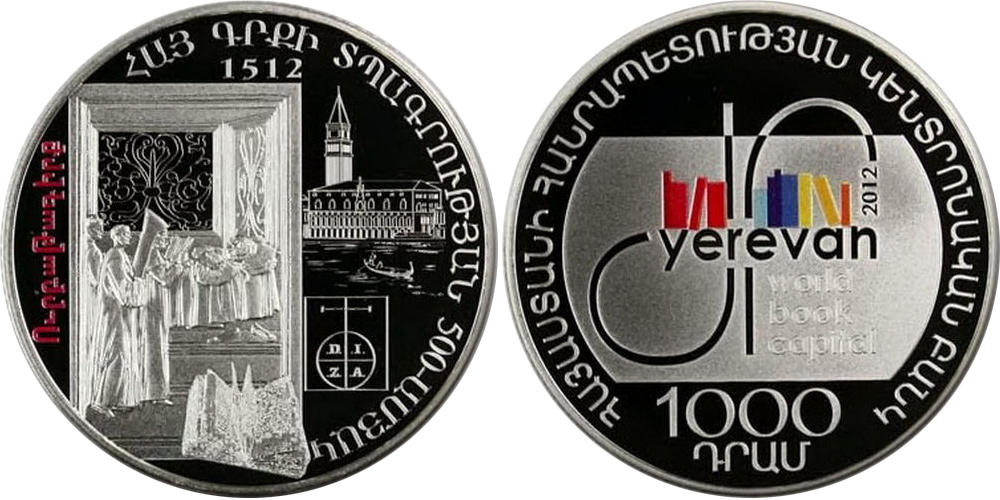116 - 500th anniversary of Armenian book printing - 1,000 dram 2012
Reference Description
This silver collector coin is dedicated to the 500th anniversary of Armenian book printing.
The first Armenian print book, Urbatagirq, was printed in Venice, Italy, in 1512 by Hakob Meghapart. The font of the book is orbicular and the printing bi-colored, in black and red.
The work got his title presumably on a basis of the word Friday which was thought to be a day influenced by mascot, while those using the book were called Urbatatesq (“Friday-imaged”). Urbatagirq is a collection of prayers and wishes: it includes extensive sections from the Gospel and the poem Book of Lamentation by Grigor Narekatsi.
Hakob Meghapart is the first Armenian printer, the beginner and founder of Armenian printing. His work was launched in Venice in early 16th century. The first Armenian mint founded by Meghapart started in 1512-1513 and it published probably 6 titles of books (5 of which survived). These are: Urbatagirq, Pataragatetr, Aghtarq, Parzatumar and Tagharan. Pages of Hakob Meghapart books are patterned. Books are small by size and cased with leather ornament. Hakob Meghapart is the pioneer in the Armenian typography. There is printing house after his name and a statue to him.
Designed by Vardan Vardanyan. Minted in the Royal Dutch Mint.
The first Armenian print book, Urbatagirq, was printed in Venice, Italy, in 1512 by Hakob Meghapart. The font of the book is orbicular and the printing bi-colored, in black and red.
The work got his title presumably on a basis of the word Friday which was thought to be a day influenced by mascot, while those using the book were called Urbatatesq (“Friday-imaged”). Urbatagirq is a collection of prayers and wishes: it includes extensive sections from the Gospel and the poem Book of Lamentation by Grigor Narekatsi.
Hakob Meghapart is the first Armenian printer, the beginner and founder of Armenian printing. His work was launched in Venice in early 16th century. The first Armenian mint founded by Meghapart started in 1512-1513 and it published probably 6 titles of books (5 of which survived). These are: Urbatagirq, Pataragatetr, Aghtarq, Parzatumar and Tagharan. Pages of Hakob Meghapart books are patterned. Books are small by size and cased with leather ornament. Hakob Meghapart is the pioneer in the Armenian typography. There is printing house after his name and a statue to him.
Designed by Vardan Vardanyan. Minted in the Royal Dutch Mint.
Specifications
Denomination: 1,000 dram
Metal: Silver 925
Weight: 33.6g
Diameter: 40mm
Mintage: 500 pcs.
Edge: Reeded
Strike quality: Proof
Metal: Silver 925
Weight: 33.6g
Diameter: 40mm
Mintage: 500 pcs.
Edge: Reeded
Strike quality: Proof
Notes
This silver collector coin is dedicated to the 500th anniversary of Armenian book printing.The first Armenian print book, Urbatagirq, was printed in Venice, Italy, in 1512 by Hakob Meghapart. The font of the book is orbicular and the printing bi-colored, in black and red. The work got his title presumably on a basis of the word Friday which was thought to be a day influenced by mascot, while those using the book were called Urbatatesq (“Friday-imaged”). Urbatagirq is a collection of prayers and wishes: it includes extensive sections from the Gospel and the poem Book of Lamentation by Grigor Narekatsi.Hakob Meghapart is the first Armenian printer, the beginner and founder of Armenian printing. His work was launched in Venice in early 16th century. The first Armenian mint founded by Meghapart started in 1512-1513 and it published probably 6 titles of books (5 of which survived). These are: Urbatagirq, Pataragatetr, Aghtarq, Parzatumar and Tagharan. Pages of Hakob Meghapart books are patterned. Books are small by size and cased with leather ornament. Hakob Meghapart is the pioneer in the Armenian typography. There is printing house after his name and a statue to him.
See All Items in Category
Citation
“116 - 500th anniversary of Armenian book printing - 1,000 dram 2012,” Armenian Numismatic Research Organization, accessed April 26, 2025, https://armnumres.org/items/show/261.


